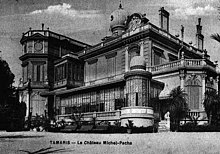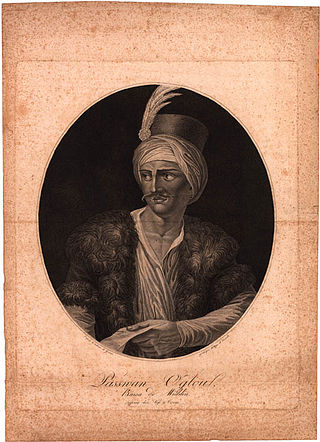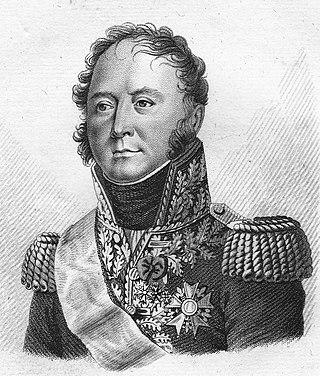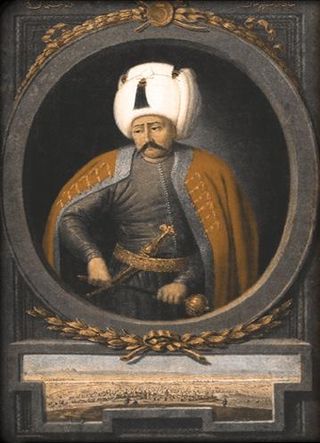
Blaise-Jean-Marius Michel, Comte de Pierredon (1819-1907), also known as Michel Pasha or Michel Pacha in French, was a French architect and lighthouse builder.

Blaise-Jean-Marius Michel, Comte de Pierredon (1819-1907), also known as Michel Pasha or Michel Pacha in French, was a French architect and lighthouse builder.
He was born in Sanary, near Toulon, Provence, in 1819. He became a merchant navy officer and traveled frequently between Marseilles and the Near East for the company Messageries Imperiales. [1]
Following a shipwreck accident in the eastern Mediterranean he was involved in, he wrote to the French Emperor Napoleon III (reigned 1848-1870), suggesting a network of lighthouses along the coasts of the Ottoman Empire. Napoleon, who was seeking to advance France's influence over the Ottoman Empire, put the proposal forward. Shortly before the end of the Crimean War (1853-1856) in 1855, the French ambassador at the Sublime Porte, Antoine Thouvenel convinced Sultan Abdülmecid I (reigned 1839-1861) to construct lighthouses along the Bosphorus. [1]
Michel became head of the Ottoman Lighthouse Authority. After the building of a number of lighthouses, [2] he established his own firm "Collas and Michel Co." with another officer, Camille Colas (1819-1898). In 1860, the company negotiated the first concession contract, which was in particular strategic interest for the Ottoman Empire. [1]
The company built lighthouses and charged the vessels passing by for the lighthouse service. The fees were collected through offices in the Empire. The high profits, making 73% of the revenues with an average FF 3.6 million in the period from 1862 to 1913, were shared between the company owners and the Ottoman state. Within the first twenty years, almost a hundred lighthouses were built across the empire with lantern lenses imported from France. [1]
Michel and Collas became very wealthy through this business. While Collas put his assets in the project of Jaffa–Jerusalem railway, Michel invested in a seaside resort at the French Riviera. [1]
Returning to Sanary in 1872, he became Mayor, using part of his fortune to rebuild the harbor and the town church. In 1879, he came back to the Ottoman Empire, charged with rebuilding the harbor of Constantinople to modern design. [2] In return, he obtained the honorary title of Pasha from Sultan Abdülaziz (reigned 1861-1876). He was further created a Chevalier of the légion d'honneur by the Republic in 1880, and Comte de Pierredon by Pope Leo XIII in 1882.
As mayor of Sanary, he planned to turn the nearby area of Tamaris into a fashionable modern resort. [2] Michel died, however, without seeing his project completed. Tamaris was part built with a casino, hotels, a marina, grand houses and around 20 unique villas built. Tamaris was built to be a holiday resort for well to do Parisians. It remains a little-known but attractive and peaceful resort on the outskirts of La Seyne-sur-Mer.
Michel Pasha also made a donation to help biologist Raphaël Dubois, discoverer of the chemical nature of bioluminescence to found a marine biology station in Tamaris.

A lighthouse is a tower, building, or other type of physical structure designed to emit light from a system of lamps and lenses and to serve as a beacon for navigational aid for maritime pilots at sea or on inland waterways.
A missus dominicus, Latin for "envoy[s] of the lord [ruler]" or palace inspector, also known in Dutch as Zendgraaf, meaning "sent Graf", was an official commissioned by the Frankish king or Holy Roman Emperor to supervise the administration, mainly of justice, in parts of his dominions too remote for frequent personal visits. As such, the missus performed important intermediary functions between royal and local administrations. There are superficial points of comparison with the original Roman corrector, except that the missus was sent out on a regular basis. Four points made the missi effective as instruments of the centralized monarchy: the personal character of the missus, yearly change, isolation from local interests and the free choice of the king.

Osman Pazvantoğlu was an Ottoman Bosnian soldier, governor of Vidin after 1794, and a rebel against Ottoman rule.

Augustin Daniel Belliard, comte Belliard et de l'Empire was a French general.

The siege of Rhodes of 1522 was the second and ultimately successful attempt by the Ottoman Empire to expel the Knights of Rhodes from their island stronghold and thereby secure Ottoman control of the Eastern Mediterranean. The first siege in 1480 had been unsuccessful. Despite very strong defenses, the walls were demolished over the course of six months by Turkish artillery and mines.

Comte Louis-Joseph-Alexandre de Laborde was a French antiquary, liberal politician and writer, a member of the Académie des Sciences morales et politiques (1832), under the rubric political economy.

Haim Farhi, was a Jewish adviser to the governors of the Galilee in the days of the Ottoman Empire, until his assassination in 1820.

François Baron de Tott was an aristocrat and a French military officer of Hungarian origin. Born on August 17, 1733, in Chamigny, a village in northern France, the descendant of a Hungarian nobleman, who had emigrated to the Ottoman Empire and then moved on to France with the cavalry of Count Miklós Bercsényi, and was later raised to the rank of baron.

The Muhammad Ali dynasty or the Alawiyya dynasty was the ruling dynasty of Egypt and Sudan from the 19th to the mid-20th century. It is named after its progenitor, Muhammad Ali of Egypt, regarded as the founder of modern Egypt.

Charles-Frédéric, comteReinhard was a Württembergian-born French diplomat, essayist, and politician who briefly served as the Consulate's Minister of Foreign Affairs in 1799. A Girondist during the early stages of the French Revolution, he was dispatched to several countries before and after his ministerial mandate. In 1806–1807, he was appointed Consul and Resident to Moldavia, and subsequently arrested by the Russian Empire for one year. Reinhard was promoted under the Bourbon Restoration governments, which he represented to the German Confederation, and continued his political career under the July Monarchy.

Joseph Naudet was a French historian who was a native of Paris.

Jean Tulard is a French academic and historian. Considered one of the best specialists of Napoleon Bonaparte and the Napoleonic era, he is nicknamed by his peers "the master of Napoleonic studies".

Raymond Haroutioun Kévorkian is a French Armenian historian. He is a Foreign Member of Armenian National Academy of Sciences. Kevorkian has a PhD in history (1980), and is a professor.

Honoré Muraire, was a French statesman of the French Revolution. Under the Ancien Régime he held the title of seigneur of Favas; later under the French Empire he held a title of comte de l'Empire.

The Ottoman Empire was founded at the beginning of the 14th century. Beginning in the 16th century, it also began acquiring possessions following series of wars in coastal North Africa.

Claude Ambroise Régnier, duc de Massa, was a French lawyer and politician. He was a deputy in 1789, a member of the Council of Ancients, a member of the Senate and a Minister.

Barbier, Benard, et Turenne (BBT) was a French company founded in 1862, specializing in the manufacture of spotlights, Fresnel lenses for lighthouses, and lighting systems. It was the world's leading producer of lighthouse beacons from the end of the 19th century onwards. It dissolved in 1982.

The Ministry of Foreign Affairs was the department of the Imperial Government responsible for the foreign relations of the Ottoman Empire, from its establishment in 1836 to its abolition in 1922. Before 1836, foreign relations were managed by the Reis ül-Küttab, who was replaced by a Western-style ministry as part of the Tanzimat modernization reforms. The successor of the Ottoman Ministry of Foreign Affairs is the Ministry of Foreign Affairs of the Turkish Republic.
Michel Kaplan is a French medieval historian, docteur d'État, professor emeritus and former president of Pantheon-Sorbonne University. He is a Byzantinist specialising in history of mentalities, rural space and hagiography of the Eastern Roman Empire.
The Translation Office was an organ of the Government of the Ottoman Empire that translated documents from one language to another.